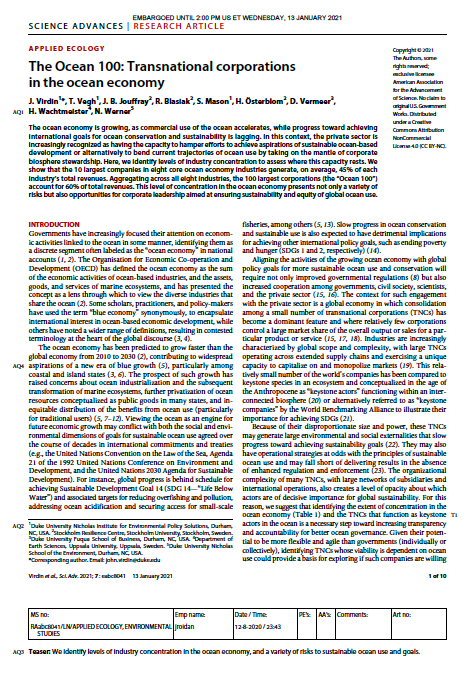Publications
Power Sector Carbon Reduction: An Evaluation of Policies for North Carolina
This report reflects extensive modeling, policy and economic analysis, and stakeholder engagement in regard to the North Carolina Clean Energy Plan. It does not make specific recommendations but evaluates different policies and offers options for decarbonizing the grid.
Exploring the Use of Ecosystem Services Conceptual Models to Account for the Benefits of Public Lands: An Example from National Forest Planning in the United States
A shared understanding of the benefits and tradeoffs to people from alternative land management strategies is critical to successful decision-making for managing public lands and fostering shared stewardship. This study describes an approach for identifying and monitoring the types of resource benefits and tradeoffs considered in National Forest planning in the United States under the 2012 Planning Rule and demonstrates the use of tools for conceptualizing the production of ecosystem services and benefits from alternative land management strategies.
International Good Practice Principles for Sustainable Infrastructure
The International Good Practice Principles for Sustainable Infrastructure set out ten guiding principles that policymakers can follow to help integrate sustainability into infrastructure planning and delivery. They are focused on integrated approaches and systems-level interventions that governments can make to create an enabling environment for sustainable infrastructure.
Assessing the Long-Term Impacts of COVID-19 on Electricity Consumption
On March 11, 2020, the World Health Organization declared the COVID-19 outbreak a global pandemic, sending the United States economy reeling. In 11 months, the virus has spread to every corner of the country. Public safety guidelines from the Centers for Disease Control and Prevention, interstate and international travel bans, and local restrictions on public gatherings have fundamentally changed the daily lives of Americans, reshaping the way we use energy. As the U.S. recovers from the pandemic, it remains to be seen which changes rebound and which leave permanent marks on the energy landscape.
Greenhouse Gas (GHG) Emission Mitigation and Ecosystem Adaptation along Belt and Road Initiative
Since its launch in 2013, the Chinese Road and Belt Initiative (BRI) has grown into a platform for any countries and regions that wish to participate, with global connectivity as the orienting goal. However, since its inception, concerns over the BRI’s potential impacts on ecology, environment and resilience, as well as its implications for global climate change and sustainability, have gathered force. As this thematic issue goes to press, these already complex BRI issues have been compounded by challenges from the COVID-19 pandemic.
Housing Precarity & the COVID-19 Pandemic: Impacts of Utility Disconnection and Eviction Moratoria on Infections and Deaths Across US Counties
The COVID-19 pandemic has necessitated the adoption of a number of policies that aim to reduce the spread of the disease by promoting housing stability. Housing precarity, which includes both the risk of eviction and utility disconnections or shut-offs, reduces a person’s ability to abide by social distancing orders and comply with hygiene recommendations. Our analysis quantifies the impact of these various economic policies on COVID-19 infection and death rates using panel regression techniques to control for a variety of potential confounders.
Streams of Revenue: The Restoration Economy and the Ecosystems It Creates
An analysis of stream mitigation banking and the challenges of implementing market-based approaches to environmental conservation.
Recognize Fish as Food in Policy Discourse and Development Funding
The international development community is off-track from meeting targets for alleviating global malnutrition. Meanwhile, there is growing consensus across scientific disciplines that fish plays a crucial role in food and nutrition security. However, this ‘fish as food’ perspective has yet to translate into policy and development funding priorities.
Does China’s Carbon Emissions Trading Scheme Really Work? A Case Study of the Hubei Pilot
China launched seven emissions trading scheme (ETS) pilots in 2011, and a national ETS, at the end of 2017 in an attempt to reduce its greenhouse gas emissions (GHGs) and drive its extensive energy transition in a cost-effective way. The Hubei province pilot ETS has operated since 2014, and an analysis of its effectiveness can provide lessons for the nascent national system.
The Ocean 100: Transnational Corporations in the Ocean Economy
The ocean economy is growing, as commercial use of the ocean accelerates, while progress toward achieving international goals for ocean conservation and sustainability is lagging. In this context, the private sector is increasingly recognized as having the capacity to hamper efforts to achieve aspirations of sustainable ocean-based development or alternatively to bend current trajectories of ocean use by taking on the mantle of corporate biosphere stewardship. Here, we identify levels of industry concentration to assess where this capacity rests.










